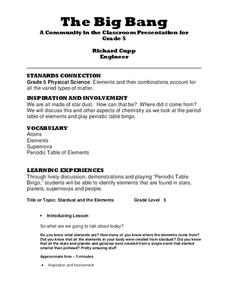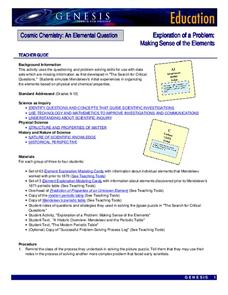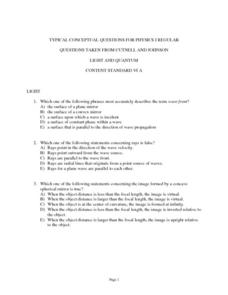Curated OER
Building Blocks of Matter
In this science worksheet, students identify different parts of one element from the periodic table. Students also complete a chart by writing the appropriate characteristics for metals, metalloids, and nonmetals.
Curated OER
The Big Bang
Fifth graders relate the elements in the human body to those produced during a supernova. In this space science and chemistry lesson, 5th graders listen to a lecture and view visuals about the big bang. They relate the production of...
NASA
Exploration of a Problem: Making Sense of the Elements
When given too much data to simply memorize, it helps to sort it into manageable groups. The second lesson in the six-part series of Cosmic Chemistry challenges groups of pupils to take a large amount of data and figure out how to best...
Science Geek
Element Classes
Introduce your young chemists to alkali metals, alkali earth metals, transition metals, metalloids, nonmetals, halogens, and noble gasses with a presentation that explains the classes of elements and a few facts about each.
Biology Junction
Chemistry
You matter—unless you multiply yourself by the speed of light squared, then you energy! Scholars learn about matter, energy, the elements and so much more using an informative presentation. Completing the included worksheet creates a...
American Museum of Natural History
Atomic Mobile
Structure an activity around atoms. Learners use their knowledge of the parts of atoms—the protons, neutrons, and electrons—to build a model of a carbon atom. Scholars create a nucleus by using clay balls to represent the protons and...
Curated OER
Chemistry Foundations
Extensive notes on foundational chemistry concepts make up this resource. It summarizes the properties of matter, the periodic table, chemical nomenclature, and general chemical bonding. Design a set reading comprehension questions to go...
Curated OER
The Periodic Table
Eighth graders read and interpret the Periodic Table. They also make decisions on how to group and arrange different kinds of matter and draw the structure of atoms of pure elements. Finally, 8th graders contrast and compare basic...
Curated OER
Metal Reactivity
In this chemistry worksheet, students select answers to 23 fill in the blank questions from the word list provided. They determine the reactivity of metals in the periodic table.
Curated OER
How Can You Tell One Clear Gas From Another?
Fifth graders perform experiments to determine the identity of an unknown gas sample. In this chemistry lesson, 5th graders fill balloons with air, oxygen, hydrogen, and carbon dioxide. They use mass and reactivity to identify the gases.
Curated OER
Classifying Elements
You can detail the important terms in element classification through this useful resource. This presentation describes individual elements, and details characteristics, and general facts that can make them easier to group.
Curated OER
2009 U.S. National Chemistry Olympiad National Exam - Part I
The 2009 version of the first part of a national chemistry competition is posted for your use with olympiad hopefuls. Test takers deal with 60 multiple choice questions covering an entire year of chemistry curriculum. Use this to...
Curated OER
Typical Conceptual Questions for Physics I - Light and Quantum
This is a stellar overview of everything light and quantum! There are 30 multiple choice questions, none of them requiring any mathematical computation. There are a few diagrams to analyze: light rays striking reflective and refractive...
Curated OER
The Periodic Table
In this periodic table worksheet, students review the elements and how they are organized in the periodic table. This worksheet has 10 fill in the blank, 6 multiple choice, and 5 short answer questions.
Curated OER
Elements
Students explore the periodic table. In this Chemistry lesson plan, students will review how Mendeleyev predicted the missing elements in the periodic table. The students will then be assigned one of the missing elements to research...
Curated OER
Lesson Plan with Technology - Introduction to Elements and Symbols
Middle schoolers use a computer program to study elements and the periodic table. They follow the directions on the computer program, and answer the questions presented. The program is self scoring, and students may print a certificate...
Curated OER
Understanding Oxidation Numbers
Students review atomic numbers, positive and negative charges, and the periodic table. They examine the relationships among protons and electrons, location of various elements, electron energy levels, and oxidation numbers.
Curated OER
Metals, Non-Metals, Metalloids
Learners describe properties of various elements. They arrange the elements based on properties in order to explain the organization of the periodic table. They label elements as metal, non-metal, or metalloid.
Curated OER
Families of Elements
In this elements worksheet, students classify the given elements according to where they are located in the periodic table. This worksheet has 1 short answer and 4 fill in the blank questions.
Curated OER
Lewis Structures
In this Lewis structures worksheet, students identify and describe what Lewis structures or dot diagrams are and how they illustrate the valence electrons in an outer shell. Then they use a periodic table to determine the numbers of...
Curated OER
Chemical Elements: Teacher Story
In this chemical elements: teacher story worksheet, students use the periodic table to write down the name and symbol of the first 10 elements. Students then complete a story by filling in the blanks with the names of the elements of the...
Curated OER
Mass, Mole, Volume Conversions
In this conversion worksheet, pupils make the following conversions, showing each step. Students use the periodic table and express all molar masses to 1 decimal place.
Curated OER
5th grade science review
In this science review worksheet, 5th graders answer questions about molecules, force, elements, nature, and more. Students complete 25 multiple choice questions.
Curated OER
Periodic Table Patterns using Fabulous Periodic
Students explain how elements are arranged in the periodic table. In this chemistry lesson, students group the eggs according to a certain pattern. They compare this to elements in the periodic table.

























